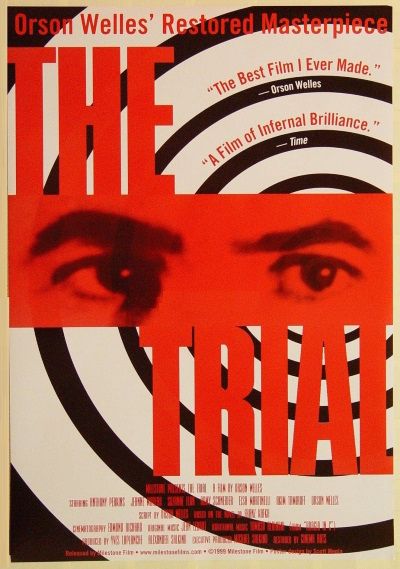After a brief respite, I was back at the cinema to see Orson Welles' 1963 The Trial, an adaptation of Franz Kakfa's novel of the same name. I'd seen a rather poor transfer previously on VHS or DVD, likely from the fine folks at Four Star. This is was a 4K copy of a restoration done quite recently.
Preceding it was another The Trial, this one a short by Ryan Perez. It spoofs the Kafka elements as the defendant makes a big to-do about the charges and demands to know what it was that he'd done wrong. Well, the judge tells him. Very funny with some fine cinematography.
Welles' version of the story stars Anthony Perkins as Josef K. He wakes up as a man enters his room who may or may not be a police officer. He won't say. A long take sees Josef get out of bed, plead his case, change clothes, et al as a series of men who may or may not be police officers wander in and out of his room telling him that he's in trouble. And, oddly enough, three of Josef's co-workers cower in an adjacent room, ready to give testimony against him to the men who may or may not be the police.
Edmond Richard's stark black & white cinematography here is simply fantastic. I think most shots were done with a short lens which provided great depth of field. Characters approach the camera from far away and end up right in front of it and are in focus the whole time. The use of these lenses also captures panoramic views of the sets which usually have vast vaulted ceiling and are almost always cluttered with stuff. In some scenes, great shelves hem in characters while framing and support beams create a maze of perpendicular lines for people to navigate. Josef K.'s office is a vast warehouse of typists that must surely have influenced Terry Gilliam.
In addition to the sets almost always being byzantine spaces, the sense of space is crazy here. For instance, Josef goes to visit an artist named Titorelli who resides in what appears to be a dilapidated water tower. Josef leaves by what I suppose you'd call the back door. He opens it only to find that it leads to a records room with shelves lined with files.
I have only hinted at just how wonderfully bizarre the film is. For instance, in the scene where Josef goes to meet Titorelli, he is hounded by a menacing gaggle of pubescent girls as he ascends the stairs of the water tower. He is told to consult with a lawyer named Albert Hastler. Played by Welles himself, Hastler seems to remain in bed most of the time smoking cigars and consorting with his mistress, Leni.
The absurdity of most everything in the tale, including, famously, the trial where Josef K. can't figure out what he's done wrong, the noir-like use of light & shadow, the huge, cathedral-like sets that seem to dwarf the characters, low angled shots, upbeat jazz music undergirding scenes of surreal action and dialogue - everything here conspires to confuse and irk the viewer - to throw us off, to create of sense of unease because nothing seems to quite add up.
I adore The Trial. Welles was a genius and this was a tour de force for Edmond Richard. Perkins was great too. Well, all the acting was. The sets were amazing. It was great to see it on the big screen finally and this restoration looked simply spectacular.

No comments:
Post a Comment